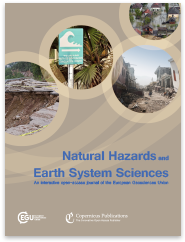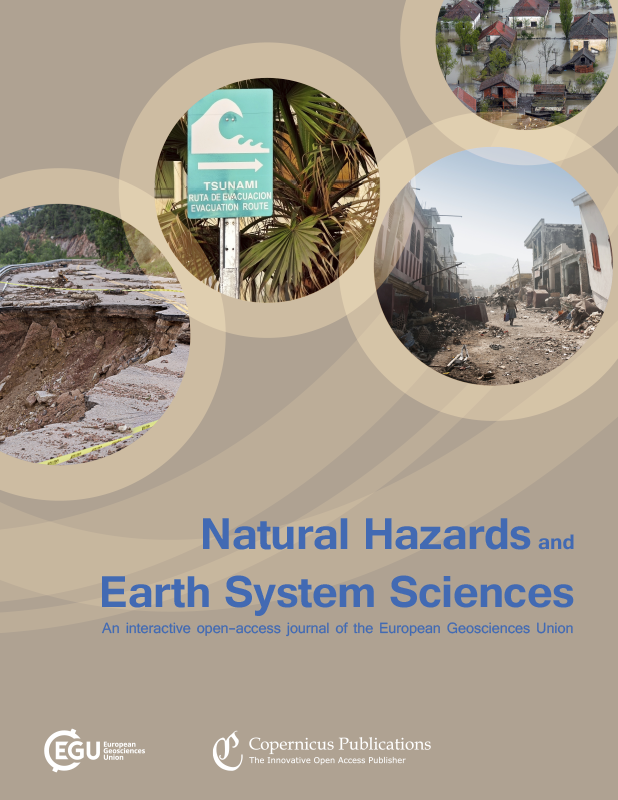Executive editors: Animesh Gain, Margreth Keiler, Gregor C. Leckebusch, Bruce D. Malamud, Paolo Tarolli & Uwe Ulbrich
eISSN: NHESS 1684-9981, NHESSD 2195-9269
Natural Hazards and Earth System Sciences (NHESS) is a not-for-profit interdisciplinary and international journal dedicated to the public discussion and open-access publication of high-quality studies and original research on natural hazards and their consequences. Embracing a holistic Earth system science approach, NHESS serves a wide and diverse community of research scientists, practitioners, and decision makers concerned with detection of natural hazards, monitoring and modelling, vulnerability and risk assessment, and the design and implementation of mitigation and adaptation strategies, including economical, societal, and educational aspects.
Journal metrics
NHESS is indexed in the Web of Science, Scopus, Google Scholar, etc. We refrain from displaying the journal metrics prominently on the landing page since citation metrics used in isolation do not describe importance, impact, or quality of a journal. However, these metrics can be found on the journal metrics page.
News
10 Feb 2025
Thank you to all our referees in 2024!
A big thank you to all referees for their volunteer work in providing fair, thorough, and constructive peer-review reports! Through their invaluable contribution our interactive open-access journals maintain their high scientific standards and their ongoing success. 
10 Feb 2025
Thank you to all our referees in 2024!
A big thank you to all referees for their volunteer work in providing fair, thorough, and constructive peer-review reports! Through their invaluable contribution our interactive open-access journals maintain their high scientific standards and their ongoing success. 
05 Feb 2025
Copernicus Publications and all journals left Twitter
The Copernicus Twitter account as well as all Twitter accounts of journals published by us have been deactivated. There will be no automatic feeds of newly posted preprints or published journal articles anymore, we do not actively tweet, and the status informs that the accounts are no longer maintained. Twitter is no longer linked from the journal websites or in the share section of the preprint or journal article HTML pages.
05 Feb 2025
Copernicus Publications and all journals left Twitter
The Copernicus Twitter account as well as all Twitter accounts of journals published by us have been deactivated. There will be no automatic feeds of newly posted preprints or published journal articles anymore, we do not actively tweet, and the status informs that the accounts are no longer maintained. Twitter is no longer linked from the journal websites or in the share section of the preprint or journal article HTML pages.
28 Nov 2025
Assessing human-caused wildfire ignition likelihood across Europe
Pere Joan Gelabert, Adrián Jiménez-Ruano, Clara Ochoa, Fermín Alcasena, Johan Sjöström, Christopher Marrs, Luís Mário Ribeiro, Palaiologos Palaiologou, Carmen Bentué Martínez, Emilio Chuvieco, Cristina Vega-García, and Marcos Rodrigues
Nat. Hazards Earth Syst. Sci., 25, 4713–4729, https://doi.org/10.5194/nhess-25-4713-2025,https://doi.org/10.5194/nhess-25-4713-2025, 2025
Short summary
27 Nov 2025
Multi-hazards in Scandinavia: impacts and risks from compound heatwaves, droughts and wildfires
Gwendoline Ducros, Timothy Tiggeloven, Lin Ma, Anne Sophie Daloz, Nina Schuhen, Judith Claassen, and Marleen C. de Ruiter
Nat. Hazards Earth Syst. Sci., 25, 4693–4712, https://doi.org/10.5194/nhess-25-4693-2025,https://doi.org/10.5194/nhess-25-4693-2025, 2025
Short summary
26 Nov 2025
Extreme precipitation and flooding in Berlin under climate change and effects of selected grey and blue-green measures
Franziska Tügel, Katrin M. Nissen, Lennart Steffen, Yangwei Zhang, Uwe Ulbrich, and Reinhard Hinkelmann
Nat. Hazards Earth Syst. Sci., 25, 4673–4692, https://doi.org/10.5194/nhess-25-4673-2025,https://doi.org/10.5194/nhess-25-4673-2025, 2025
Short summary
Highlight articles
05 Sep 2025
Failure of Marmolada Glacier (Dolomites, Italy) in 2022: data-based back analysis of possible collapse mechanisms
Roberto Giovanni Francese, Roberto Valentino, Wilfried Haeberli, Aldino Bondesan, Massimo Giorgi, Stefano Picotti, Franco Pettenati, Denis Sandron, Gianni Ramponi, and Mauro Valt
Nat. Hazards Earth Syst. Sci., 25, 3027–3053, https://doi.org/10.5194/nhess-25-3027-2025,https://doi.org/10.5194/nhess-25-3027-2025, 2025
Short summary
More highlight articles  All EGU highlight articles
All EGU highlight articles 
Notice on the current situation in Ukraine
To show our support for Ukraine, all fees for papers from authors (first or corresponding authors) affiliated to Ukrainian institutions are automatically waived, regardless if these papers are co-authored by scientists affiliated to Russian and/or Belarusian institutions. The only exception will be if the corresponding author or first contact (contractual partner of Copernicus) are from a Russian and/or Belarusian institution, in that case the APCs are not waived.
In accordance with current European restrictions, Copernicus Publications does not step into business relations with and issue APC-invoices (articles processing charges) to Russian and Belarusian institutions. The peer-review process and scientific exchange of our journals including preprint posting is not affected. However, these restrictions require that the first contact (contractual partner of Copernicus) has an affiliation and invoice address outside Russia or Belarus.




